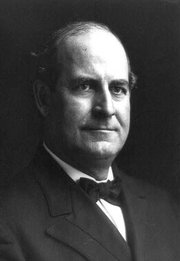William Jennings Bryan
From dKosopedia
Categories: All articles with unsourced statements | Articles with invalid date parameter in template | Articles with unsourced statements | Nebraska Democrats | Secretaries of State
William Jennings Bryan (1860-1925) was the Democrat nominee for president in 1896, 1900, and 1908. A gifted orator, he is sadly remembered today for his defense of creationism in the Scopes Trial rather than for his life time of work that resulted in the turning the Democratic Party from Conservative to Liberal.
Bryan, originally from Illinois, moved to Nebraska, a strongly Republican state at the time, and ran for the House of Representatives for the seat based in Omaha in 1892. Adopting a populist campaign and taking advantage of an anti-incumbent sentiment, he surprised many in his own party by winning. Bryan had supported James Weaver for president in 1892, and many of the party's eastern members, including president Grover Cleveland were alarmed at his sudden rise to prominence.
Cleveland had good reason to worry. Bryan, using populist themes of resentment toward easterners, banks, and businessmen, was nominated at the Democrats' 1896 convention. At 36, he remains the youngest nominee for president by a major U.S. party. Bryan's most famous plank was in favor of coining silver, which won him the endorsement of many western Republicans, but caused many eastern Democrats to bolt. But the platform also included socialization of the railways, stronger regulation of business, and government-backed insurance for farmers.
Bryan traveled 18,000 miles through 27 states, something few presidential candidates did in those days. When told that it was undignified to campaign in that way, Bryan retorted that they had called Abraham Lincoln undignified as well.
Bryan appeared to have a slight lead at first, but as the economic crunch following the Panic of 1893 ended, his message lost some of its urgency. Bryan won 46% of the popular vote, losing to Republican William McKinley, who won 51%. But Bryan was buried in the electoral college, 271 to 176.
Bryan ran again against McKinley in 1900, this time on an anti-imperialism platform. He performed much better in the east this time around, even winning over his old rival Grover Cleveland, but did much worse in the west, and went on to lose to McKinley 52-45 (292-155 in the electoral college). He ran again in 1908 against William Howard Taft, arguing that Taft was too conservative to succeed the progressive Theodore Roosevelt, and that many of TR's ideas had been stolen from the populist Democrats anyway. Bryan again lost, 43-51 (321 to 162 in the electoral college).
Bryan became Secretary of State in the administration of Woodrow Wilson, but as a virtual pacifist, resigned in protest{{#if:||{{#if:Category:Articles with unsourced statements|[[Category:Articles with unsourced statements {{#if:|{{#if:|from|since}} }}]]}}}}{{#if:citation needed|[citation needed]|}}{{#switch:||Template|Talk={{#if:|{{#ifexist:Category:Articles with unsourced statements since {{{date}}}||}}|}}}} in 1915, claiming that Wilson was pushing him to help the United Kingdom and France in World War I.
Bryan, who had always been a believer in creationism, argued for the prosecution in the Scopes Trial against Clarence Darrow (who, ironically, was a political supporter). Bryan died only shortly after the trial had concluded, in 1925. He is believed to have died of diabetes, a condition he'd made little effort to mitigate in his lifestyle.
Little-known fact: Bryan's younger brother Charles was the Democrat nominee for vice-president in 1924.

![[Main Page]](../../../../upload/banner-blue-135.jpg)